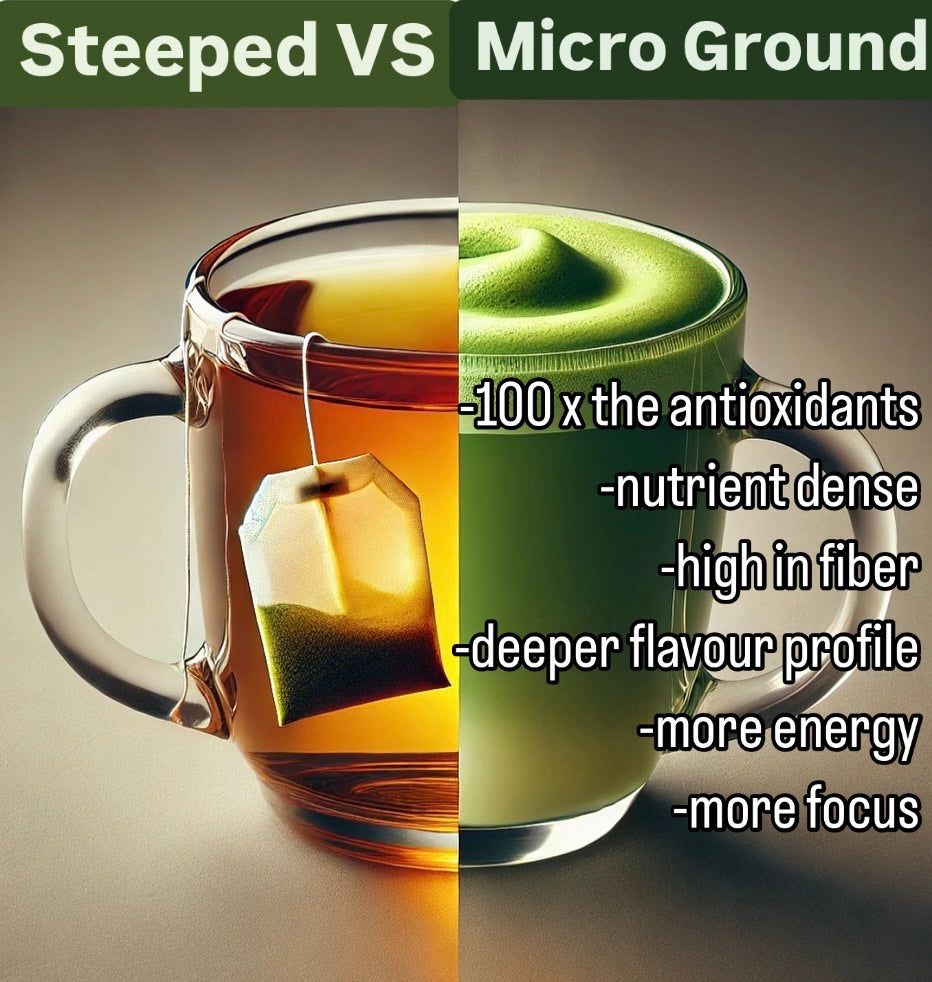Tea has long been celebrated for its health benefits. But not all teas are created equal, especially when it comes to how they’re prepared and consumed. Two popular methods of tea preparation—steeped tea and micro ground tea—offer distinct experiences and benefits. Here, we'll explore the science behind each, breaking down the unique health advantages each method provides.
Steeped Tea: The Traditional Method Steeping tea is the classic method, involving brewing tea leaves in hot water and then discarding them. While it's a widely embraced practice, this method only captures water-soluble compounds, meaning some of the nutrients stay in the leaves and never make it into your cup. Let’s dive into the specific health benefits and limitations of steeped tea.
Health Benefits of Steeped Tea
1. Antioxidant Powerhouse:
Steeping tea releases antioxidants like catechins and flavonoids, which help combat free radicals in the body, reducing inflammation and supporting heart health. Studies indicate that regular consumption of steeped tea, especially green tea, is linked with reduced risks of heart disease and certain cancers.
2. Low-Calorie, Hydrating Drink:
Steeped tea is naturally low in calories and hydrating, making it an excellent option for those looking to stay hydrated without added sugars.
3. L-Theanine for Calm and Focus:
This amino acid is known for promoting relaxation without drowsiness, enhancing focus, and balancing out the stimulating effects of caffeine. Research has shown that L-theanine combined with caffeine can improve cognitive performance, especially in green and black teas.
Loss of Nutrients: Some beneficial compounds in tea, like dietary fiber, remain locked in the leaves. As a result, many vitamins, minerals, and polyphenols are left behind.
Waste: Since the tea leaves are discarded, there’s also potential waste, both in terms of the plant material and its full nutritional potential.
Micro Ground Tea: Consuming the Whole Leaf Micro ground tea is made by grinding the entire tea leaf into a fine powder, such as matcha or micro ground blends. When you drink micro ground tea, you’re consuming the whole leaf and thus the full spectrum of nutrients it contains.
Health Benefits of Micro Ground Tea
1. Complete Nutrient Profile:
Because micro ground tea involves consuming the entire tea leaf, it provides a more complete profile of vitamins, minerals, antioxidants, and fiber. Studies show that certain compounds, such as chlorophyll and carotenoids, are more concentrated in micro ground teas like matcha.
2. High Antioxidant Content:
Micro ground tea has significantly higher levels of antioxidants compared to steeped tea. Research indicates that the antioxidant content in matcha, for example, can be up to ten times higher than in traditional steeped green tea. This concentration offers a more powerful anti-inflammatory and anti-aging effect.
3. Natural Energy Booster:
Micro ground tea contains higher levels of caffeine and L-theanine, providing a balanced energy boost. The combination helps maintain alertness without the crash that often follows coffee consumption. Studies show that the slow-release nature of caffeine and the calming effect of L-theanine make it an ideal energy source.
4. Dietary Fiber and Digestive Health:
Because you’re consuming the full leaf, micro ground tea also provides a small amount of dietary fiber. This can support digestive health and contribute to a feeling of satiety.
The Verdict: Which is Better for You? Both steeped and micro ground teas have unique health benefits, and your choice may depend on your wellness goals. If you’re looking for a more hydrating, mild tea with lower caffeine, steeped tea is a fantastic choice. However, if you want to maximize antioxidant intake, fiber, and sustained energy, micro ground tea might be your ideal match. In the end, a balance between the two can allow you to enjoy the best of both worlds. Whichever you choose, the health benefits of tea are well-documented, so make it part of your daily ritual and sip your way to better health.

